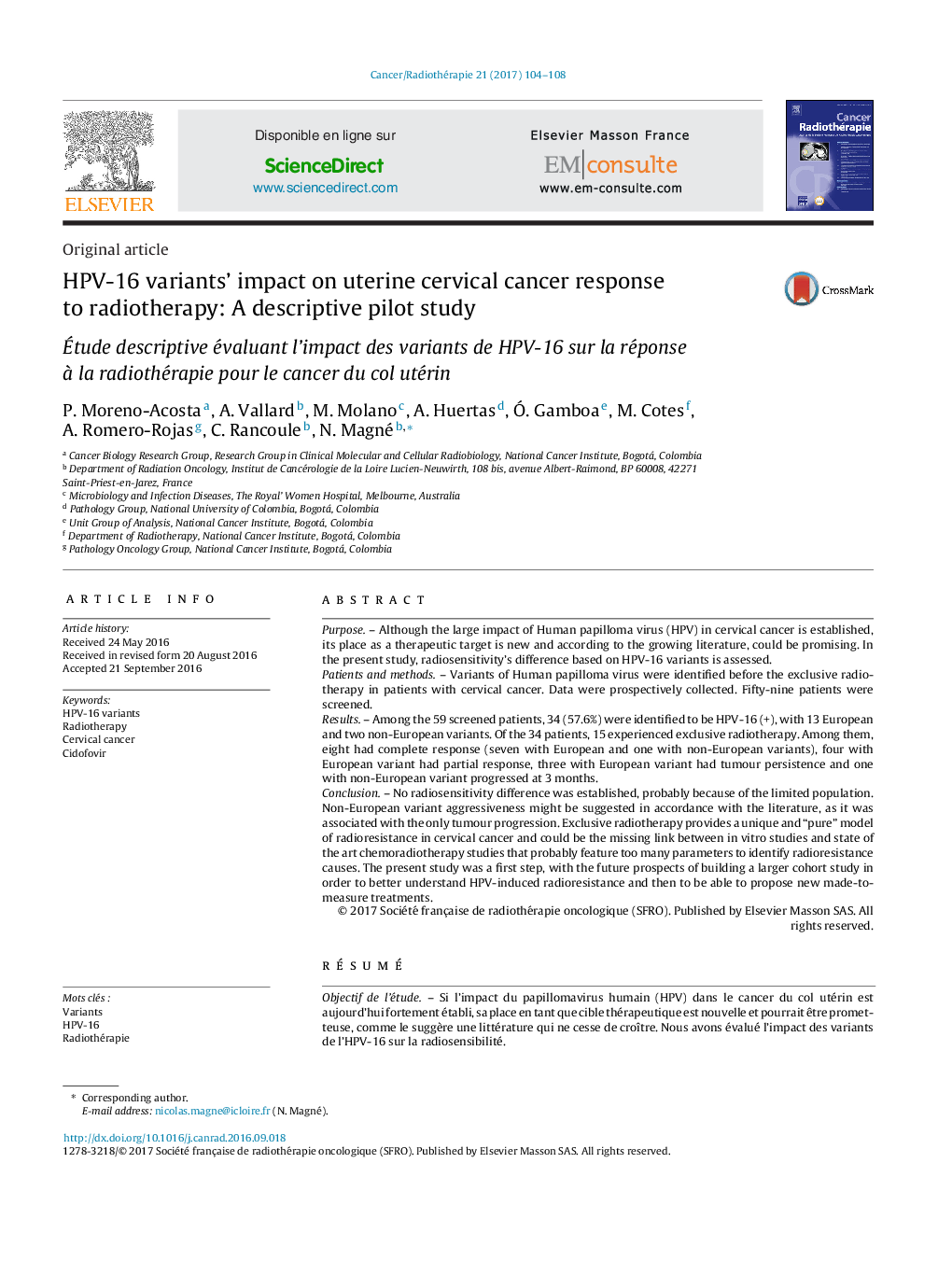| کد مقاله | کد نشریه | سال انتشار | مقاله انگلیسی | نسخه تمام متن |
|---|---|---|---|---|
| 5525918 | 1401506 | 2017 | 5 صفحه PDF | دانلود رایگان |

PurposeAlthough the large impact of Human papilloma virus (HPV) in cervical cancer is established, its place as a therapeutic target is new and according to the growing literature, could be promising. In the present study, radiosensitivity's difference based on HPV-16 variants is assessed.Patients and methodsVariants of Human papilloma virus were identified before the exclusive radiotherapy in patients with cervical cancer. Data were prospectively collected. Fifty-nine patients were screened.ResultsAmong the 59 screened patients, 34 (57.6%) were identified to be HPV-16 (+), with 13 European and two non-European variants. Of the 34 patients, 15 experienced exclusive radiotherapy. Among them, eight had complete response (seven with European and one with non-European variants), four with European variant had partial response, three with European variant had tumour persistence and one with non-European variant progressed at 3 months.ConclusionNo radiosensitivity difference was established, probably because of the limited population. Non-European variant aggressiveness might be suggested in accordance with the literature, as it was associated with the only tumour progression. Exclusive radiotherapy provides a unique and “pure” model of radioresistance in cervical cancer and could be the missing link between in vitro studies and state of the art chemoradiotherapy studies that probably feature too many parameters to identify radioresistance causes. The present study was a first step, with the future prospects of building a larger cohort study in order to better understand HPV-induced radioresistance and then to be able to propose new made-to-measure treatments.
RésuméObjectif de l'étudeSi l'impact du papillomavirus humain (HPV) dans le cancer du col utérin est aujourd'hui fortement établi, sa place en tant que cible thérapeutique est nouvelle et pourrait être prometteuse, comme le suggère une littérature qui ne cesse de croître. Nous avons évalué l'impact des variants de l'HPV-16 sur la radiosensibilité.Patientes et méthodesLes variants du papillomavirus humain ont été identifiés chez des patientes atteintes de cancer du col de l'utérus avant leur radiothérapie exclusive. Les données ont ensuite été recueillies prospectivement : 57,6 % des cancers du col utérin sélectionnés (34 sur 59) ont été identifiés comme exprimant l'HPV-16, avec 13 variants européens et deux non européens. Sur les 34 patientes, 15 ont reçu une radiothérapie exclusive.RésultatsParmi ces 15 cancers, à 3 mois, huit (avec sept variants européens et un non européen) étaient en réponse complète, quatre (avec variants européens) en réponse partielle, trois (avec variant européen) sont restés stables et un (avec variant non européen) a progressé.ConclusionAucune différence de radiosensibilité n'a pu être établie, probablement par manque d'effectif. L'agressivité des variants non européens, associée à la seule tumeur en progression, est suggérée en accord avec la littérature. Cette cohorte de radiothérapie exclusive fournit un modèle unique et « pur » de radiorésistance du cancer du col utérin et pourrait être le chaînon manquant entre les études in vitro et la littérature concernant les études de chimioradiothérapie présentant trop de paramètres pour pouvoir identifier les causes de radiorésistance. Cette étude est une première étape en vue de la réalisation d'une cohorte plus importante afin de comprendre la radiorésistance induite par le papillomavirus humain et de proposer de nouveaux traitements.
Journal: Cancer/Radiothérapie - Volume 21, Issue 2, April 2017, Pages 104-108